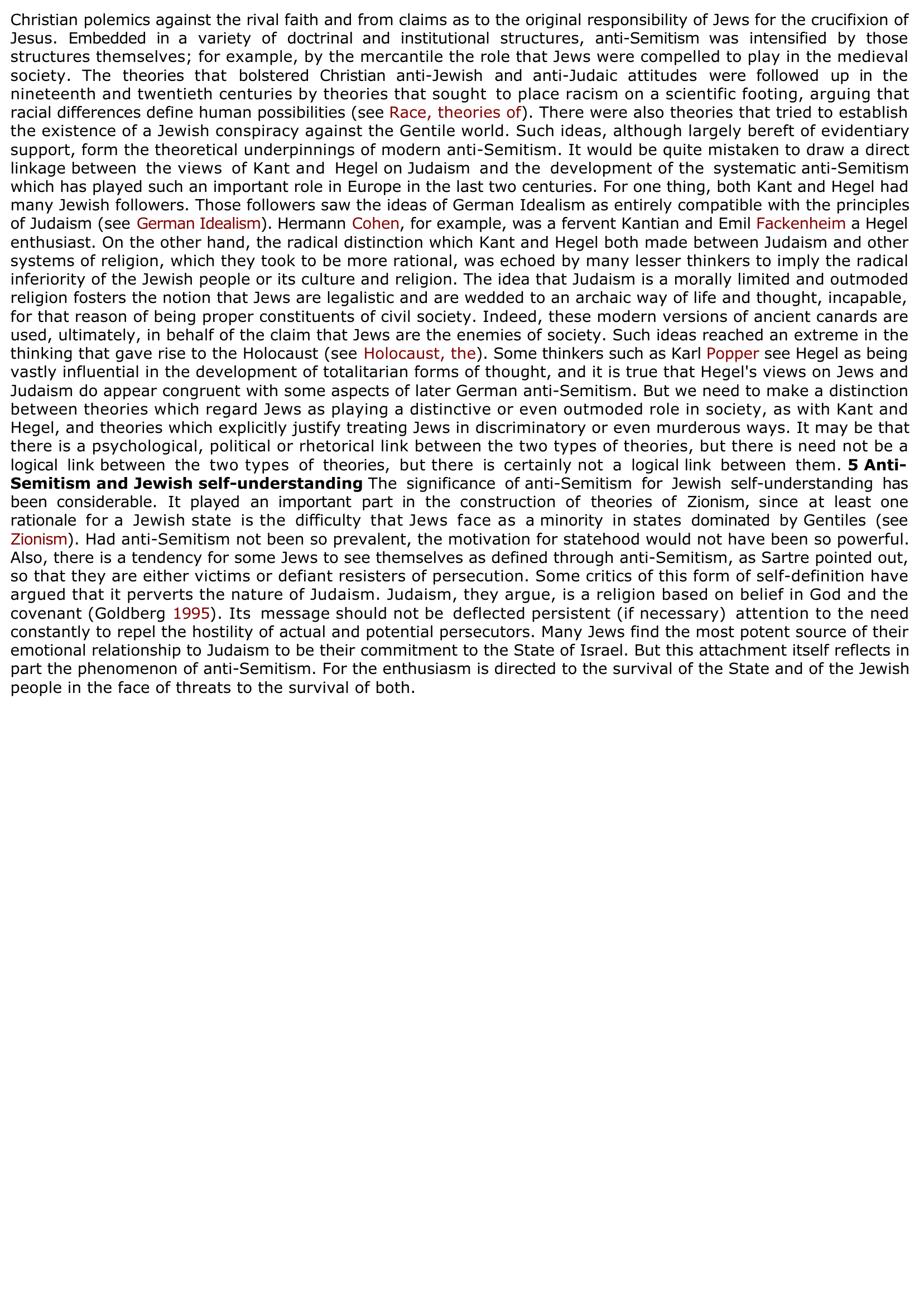Anti-Semitism
Publié le 17/01/2010

Extrait du document
Anti-Semitism is a form of racism which sees Jews as a dangerous and despicable group in society. It has solid philosophical sources in the work of German Idealism which emphasized the distinctiveness of Judaism and how it has been superseded by Christianity. Both Kant and Hegel made a sharp distinction between Judaism and what they regarded as more rational religions, and they questioned the capability of the Jewish people for playing an integral role in the state. Sartre used the notion of anti-Semitism to show how a sense of self-identity is created by the attitudes of others towards the individual and the group. That is, what makes Jews Jews is the fact that there is anti-Semitism, and there is nothing that Jews can do about anti-Semitism. Anti-Semitism is a problem for the anti-Semites themselves; anti-Semitism, by Sartre‘s account, is in fact an attempted solution to the difficulties of taking free and authentic decisions. Anti-Semitism has played an important role in Jews' self-definition, in attitudes to the State of Israel and to the religion of Judaism itself.
«
Christian polemics against the rival faith and from claims as to the original responsibility of Jews for the crucifixion ofJesus.
Embedded in a variety of doctrinal and institutional structures, anti-Semitism was intensified by thosestructures themselves; for example, by the mercantile the role that Jews were compelled to play in the medievalsociety.
The theories that bolstered Christian anti-Jewish and anti-Judaic attitudes were followed up in thenineteenth and twentieth centuries by theories that sought to place racism on a scientific footing, arguing thatracial differences define human possibilities (see Race, theories of ).
There were also theories that tried to establish the existence of a Jewish conspiracy against the Gentile world.
Such ideas, although largely bereft of evidentiarysupport, form the theoretical underpinnings of modern anti-Semitism.
It would be quite mistaken to draw a directlinkage between the views of Kant and Hegel on Judaism and the development of the systematic anti-Semitismwhich has played such an important role in Europe in the last two centuries.
For one thing, both Kant and Hegel hadmany Jewish followers.
Those followers saw the ideas of German Idealism as entirely compatible with the principlesof Judaism (see German Idealism ).
Hermann Cohen , for example, was a fervent Kantian and Emil Fackenheim a Hegel enthusiast.
On the other hand, the radical distinction which Kant and Hegel both made between Judaism and othersystems of religion, which they took to be more rational, was echoed by many lesser thinkers to imply the radicalinferiority of the Jewish people or its culture and religion.
The idea that Judaism is a morally limited and outmodedreligion fosters the notion that Jews are legalistic and are wedded to an archaic way of life and thought, incapable,for that reason of being proper constituents of civil society.
Indeed, these modern versions of ancient canards areused, ultimately, in behalf of the claim that Jews are the enemies of society.
Such ideas reached an extreme in thethinking that gave rise to the Holocaust (see Holocaust, the ).
Some thinkers such as Karl Popper see Hegel as being vastly influential in the development of totalitarian forms of thought, and it is true that Hegel's views on Jews andJudaism do appear congruent with some aspects of later German anti-Semitism.
But we need to make a distinctionbetween theories which regard Jews as playing a distinctive or even outmoded role in society, as with Kant andHegel, and theories which explicitly justify treating Jews in discriminatory or even murderous ways.
It may be thatthere is a psychological, political or rhetorical link between the two types of theories, but there is need not be alogical link between the two types of theories, but there is certainly not a logical link between them.
5 Anti- Semitism and Jewish self-understanding The significance of anti-Semitism for Jewish self-understanding has been considerable.
It played an important part in the construction of theories of Zionism, since at least onerationale for a Jewish state is the difficulty that Jews face as a minority in states dominated by Gentiles (seeZionism ).
Had anti-Semitism not been so prevalent, the motivation for statehood would not have been so powerful. Also, there is a tendency for some Jews to see themselves as defined through anti-Semitism, as Sartre pointed out,so that they are either victims or defiant resisters of persecution.
Some critics of this form of self-definition haveargued that it perverts the nature of Judaism.
Judaism, they argue, is a religion based on belief in God and thecovenant (Goldberg 1995 ).
Its message should not be deflected persistent (if necessary) attention to the need constantly to repel the hostility of actual and potential persecutors.
Many Jews find the most potent source of theiremotional relationship to Judaism to be their commitment to the State of Israel.
But this attachment itself reflects inpart the phenomenon of anti-Semitism.
For the enthusiasm is directed to the survival of the State and of the Jewishpeople in the face of threats to the survival of both..
»
↓↓↓ APERÇU DU DOCUMENT ↓↓↓
Liens utiles
- ANTI-SEMITISM IN THE MODERN PERIOD AND THE PRESENT
- ANTI-SEMITISM IN THE ANCIENT WORLD
- anti-Semitism
- ANTI-SEMITISM IN THE MEDIEVAL AND REFORMATION PERIODS
- ANTI-SEMITISM

































